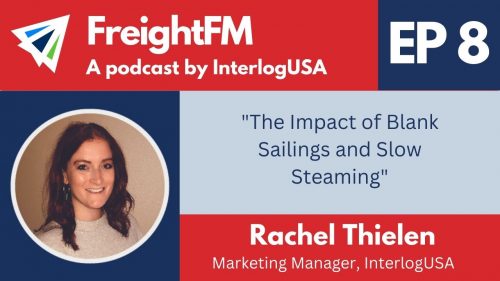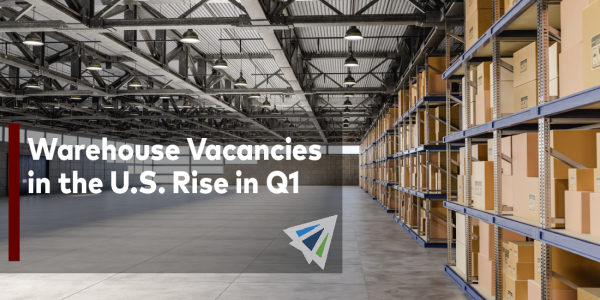Competitive Edge
May, 10th 2023

Special Alert: Weight limits in place on USEC services via the Panama Canal due to low water level
The Panama Canal is currently experiencing low water levels which has led to strict weight limitations for Asia-USEC services that route through the canal.
Most carriers are only allowed to accept up to the following cargo weights on containers: eight tons per 20’ GP; 16 tons per 40’ GP and 40’ HC. In some instances, this may even include the tare weight of the container itself.
Please note, carriers can turn away a booking if the cargo exceeds weight while also rolling over any individual containers that weigh over respective limitations.
This time of year, low water levels are not unusual as this key waterway that expedites direct Asia-USEC services is in the midst of the region’s dry season (from December to May).
Contact our team for more information on specific services and carriers. We extend our thanks to our Chinese partner, RS Logistics, for this update.
IMPORT: Asia to North America (TPEB)
Recent Developments:
• Imports volumes were up in April mirroring monthly import levels in 2019.
• Today, May 10th, is the one-year anniversary of when current West Coast contract negotiations started. WC dockworkers (ILWU) and maritime employers (PMA) remain at the negotiating table with no deal yet.
Rates: General rate increases (GRIs) remain in the market, however no firm announcements yet on more increases in mid-May or June from major carriers.
Space: Space is open.
Capacity: Open but carriers will exercise tactics, like blank sailings, in attempts to curb lower demand.
Equipment: Available at virtually all inland and coastal points. Chassis access can still pose demurrage headaches for intermodal, however.
TIPS:
• Keep a pulse on inventory and be sure to have a gameplan on when your next orders will be.
• Pay special attention to how carriers are coping with this lull in the market.
• Hold your logistics partners accountable on frequent updates regarding blank sailings, rate increases, or any other carrier tactics.
IMPORT: Europe to North America (TAWB)
Rates: Rates are falling at a slow and steady clip.
Space: Space is open.
Capacity: Capacity is open.
Equipment: Availability on both origin and destination sides, unless advised otherwise.
TIPS:
• Book at least three weeks prior to ready date.
• Premium add-ons (i.e., no-roll options and improved cargo reliability) remain assurances shippers should consider with transatlantic service.
EXPORT: North America to Asia
Recent Developments:
• This outbound side has been impacted by its dormant counterpart (TPEB), particularly on the West Coast. Top export hubs, like Oakland and Seattle, have cut down on dockworker shifts putting a strain on outbound flow.
Rates: Rates are low and level.
Space: Space is wide open.
Capacity: Capacity is widely available for all services.
Equipment: Availability at virtually all inland points and seaports. However, chassis, like for importers, can pose challenges for intermodal movement.
TIPS:
• Book at least two weeks prior to the time of departure.
• Shippers with high volume projects should take advantage of carrier receptiveness to take on these opportunities. Space is wide open with a high acceptance rate.
• Pay special attention to how the import market is impacting the export market.

InterlogUSA Proudly Presents: FreightFM Episode 8
Check out our latest episode where Interlog’s Marketing Manager, Rachel Thielen, discusses the impact blank sailings and slow steaming have on the market.
FreightFM features short-form video interviews with InterlogUSA’s industry experts offering insights into breaking news, market trends, our company’s history, and more!
Did You Know: Uncertainty Lingers Over Which Federal Agency Has the Authority to Resolve Rail Storage Fee Disputes
An association of 75 shipper groups this week have asked lawmakers to clarify that railroads should be billing ocean carriers, not shippers for overseas import containers that railroads pick up and transport to and store at rail yards throughout the country.
However, ocean carriers want rail storage fee disputes to be kept by the Surface Transportation Board (STB), not by Congress. They contend that it could add to more confusion.
Read More: Freightwaves
Freight News
Poor Service Continues to Hamper U.S. Agriculture Exporters
During the second half of last year, U.S. agriculture exports improved – largely due to port and inland congestion easing and vessel reliability improving.
Specifically, a 10.5 year-over-year spike in containerized U.S. agriculture exports in the second half of 2022 offset a 4.7 percent first-half decline.
This led to overall volumes being 0.8 percent higher for the full year at 1.53 million TEUs – per the JOC.
The beginning of this year has been a bit of a different story compared to the last half of 2022.
Through February, U.S. agriculture exports were down 6.6 percent compared to the first two months of last year.
Furthermore, some agricultural exporters say lingering service issues continue to remain during the early part of this year. One of the constant conversations that continues to be had is shipments coming in on time – especially those perishable shipments.
Companies Going After Shipping Lines Over Fee Disputes
After a turbulent last couple of years throughout the pandemic, many supply chain snarls occurred including lack of capacity, sky-high rates, congestion, etc.
Now some companies are ‘going after’ container shipping lines, alleging that those shipping lines did not perform during the supply chain crisis.
One company in particular, Bed Bath and Beyond, has alleged in their complaint to the FMC, that OOCL failed to meet minimum quantity commitments (MQC’s) under their 2020 and 2021 service contracts.
The retailer says OOCL gave away their assigned space “to other shippers to maximize [its] own profits,” which forced the retailer “to obtain space on the spot market at significant enormous expense during a period of unprecedented high spot rates.”
Additionally, the retailer wants restitution for peak season surcharges, after they allege the shipping line was “auctioning its space to the highest bidder rather than meeting service commitments.” – which is a new curve in shipper complaints against ocean carriers.
As of now, OOCL has yet to file its response to the retailers’ claims.
One question that’s on our minds is, will more companies follow suit?
Check Out Last Month's Webinar!
Topics: GRIs, Blank Sailings, Labor Talks on the USWC, Market Updates, Q&A
Sign Up For Our May Webinar!
Our next webinar is on Wednesday, May 17th at 11am CST!
We will announce topics very soon. If you have any questions or topics you would like our experts to discuss in future webinars, please let us know.
What is Coffee & Cargo? Every month, our experts sit down to discuss what’s currently happening in the shipping industry. Every so often we are joined by special guests, who share their specific expertise and experiences.
Interlog  Insights
Insights
Last week was the first week of our May Edition of Interlog Insights.
We introduced a new segment – Shipper Hotline – which allows our readers to submit [anonymous] questions to our team of experts. Then, in our weekly Insights, we will answer a question or two.
Also in last week’s Insights, we discussed the rate increases on the transpacific and the influence they had on this year’s contract season. Plus, decreases in container volumes that led to a slowdown in activity for drayage drivers out on the East Coast.
Sign up for our
industry answers
Our team works to provide valuable, unique, and relevant content to assist you in finding solutions. Sign up now.
 Freight FM
Freight FM Interlog Insights
Interlog Insights Coffee & Cargo
Coffee & Cargo
